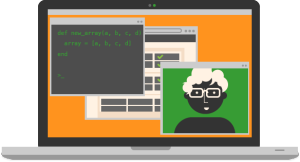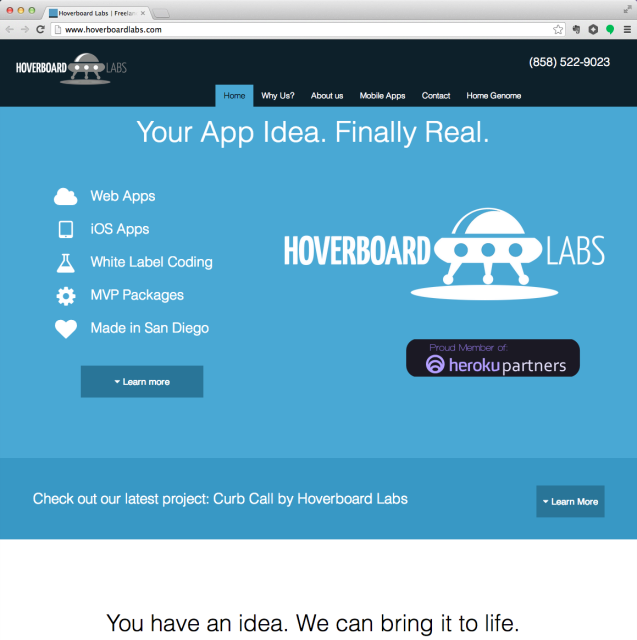Online Code School Bloc Raises $2 Million For Its Web Development “Apprenticeship” Program

A company focused on teaching anyone the fundamentals of web development, Bloc, has raised $2 million in seed funding in a round led by Harrison Metal, with First Round Capital, Baseline Ventures, and Learn Capital also participating. What’s interesting about Bloc is that, while it’s offering an online program that can be accessed anywhere a student has a computer and Internet access, it also retains the human element of teaching through a one-on-one connection between a learner and their mentor.
Bloc was founded by fellow University of Illinois at Urbana-Champaign grads Roshan Choxi (CEO) and Dave Paola (CTO) who had found themselves in the San Francisco Bay Area after college. The two shared a mutual interest in the education space, and began working together around two years ago on various projects. One of these, an early version of what has become today’s Bloc, debuted in early 2012 at the Launch conference, helping seed the company’s user base with the first few thousand signups.
With today’s version of Bloc, the idea is to connect students directly with an experienced mentor who serves as part teacher, part code reviewer, and sometimes even pair programmer, as need be.
“We believe an online apprenticeship is superior to the classroom model,” says Choxi of Bloc’s apprenticeship angle. “It’s the better way to do advanced skill training, so it’s natural that it could apply to other verticals and other topics,” he adds, hinting at the company’s broader vision as Bloc grows.

HOW IT WORKS
Today, the company offers an intense, 12-week course that trains students in HTML, CSS, JavaScript, Ruby, Rails, and more. The base price for the program is $4,250, but payment plans are available. After acceptance, students select a mentor based on their experience, language, location and availability, then schedule three meetings per week following their initial introduction.
In the subsequent weeks, students plow through a project-based curriculum built in-house, communicating with mentors during office hour sessions and chats along the way. There’s also a chat room staffed by mentors throughout the day and night, in case students are in need of help when their assigned mentor isn’t around.
Throughout the course, students also have to pass through “checkpoints” where mentors review their work, then help them get it right even if it takes a few times before they succeed.
 The co-founders tell us that the program tends to attract those who are involved with the tech industry in some way, but don’t necessarily have technical backgrounds. Around half of the students — and Bloc has seen hundreds so far — come from some major metro area, like San Francisco. But the rest come from suburban or rural areas, which is something that speaks to the accessible nature of the online program.
The co-founders tell us that the program tends to attract those who are involved with the tech industry in some way, but don’t necessarily have technical backgrounds. Around half of the students — and Bloc has seen hundreds so far — come from some major metro area, like San Francisco. But the rest come from suburban or rural areas, which is something that speaks to the accessible nature of the online program.
The other thing many students have in common is a desire to build something for themselves. “In our heads, a bootcamp is for getting a job, and Bloc is for becoming an entrepreneur,” says Paola.
The program teaches students skills that would help them in this pursuit, having them build clones of sites like Reddit or Wikipedia, for example. Then mid-way through, the students pick a capstone project to work on for themselves. The idea is that they’ll have something to actually show for their work by the end of the 12 weeks, rather than just a set of skills.


One graduate, Seth Seigler, was a real estate agent who completed Bloc then built an “Uber for real estate,” which he sold to a real estate firm where he’s now CTO. Seigler today describes Bloc as the “perfect hybrid between the self-paced tutorials and the full-time bootcamps.”
“At the end of Bloc, I knew how to learn and how to complete any project,” he says.
That being said, not all students complete their training. Over the past 18 months, Bloc has had a 90 percent graduation rate. But Choxi says that the students who drop out tend to do so because they don’t have the time for a 25-hour per week commitment, and later re-enroll a couple of months later. (Bloc offers them pro-rated refunds.) “We work very hard to ensure they have a great experience and have a very good refund policy – we believe we don’t get paid unless they get results,” he says.
For a class that has you diving right into Ruby, those are not bad numbers. But Bloc’s platform makes it appealing to students who probably have some inclination for tech in the first place, and are motivated by what they want to do with their resulting skills.
In addition to the distributed mentors, Bloc has 13 people based in San Francisco and will use the new funding in part to hire software engineers as well as a so-called “guidance counselor,” who will help students and alumni make progress and choose their career paths. The team is also looking into expanding into new courses, such as iOS development.
But for the students coming to Bloc, there’s another benefit beyond the skills they learn while attending – their one-on-one relationship with a mentor gives them an in into the tech industry – something those beyond the Bay area and other tech “hotspots” don’t always have access to.
“We think that’s one of the nice things about our community of mentors…we have some who are actually Y Combinator alumni and they also know how to code,” says Choxi. “Students ask them questions that are a little bit tangential to web development, but are still relevant starting a company. That’s something you can only develop when you have a personal relationship with your mentor,” he notes.

Leave a Reply